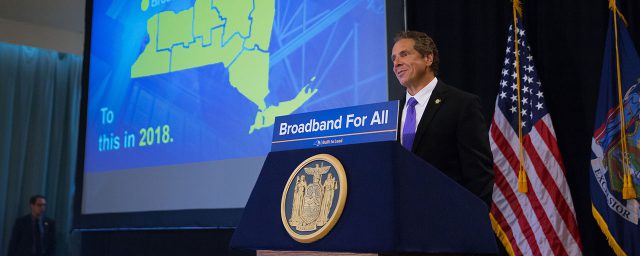 Charter Communications’ ongoing settlement talks with the New York Public Service Commission are “productive” and will likely result in a final settlement agreement allowing Spectrum to continue operating in New York.
Charter Communications’ ongoing settlement talks with the New York Public Service Commission are “productive” and will likely result in a final settlement agreement allowing Spectrum to continue operating in New York.
Today, the Public Service Commission formally approved a third extension for Charter, allowing the cable company to hold off filing an orderly exit plan and an appeal of the order revoking approval of Charter’s acquisition of Time Warner Cable in New York State. Department of Public Service (DPS) staff recommended one last 45-day extension to allow settlement discussions to continue and conclude.
“These discussions have been productive and should continue. However, DPS Staff believes that the Commission should direct that any request granted in response to Charter’s most recent filing be final in form and that any additional time allowed must either result in a settlement agreement being presented to the Commission or the cessation of settlement talks and a resumption of the processes outlined in the Revocation and Compliance Orders, unless good cause is shown by both parties,” wrote John J. Sipos, acting general counsel for the Public Service Commission. “This will ensure that progress is made or that in the event a settlement is not reached, that there is certainty as to the expectations on the parties going forward.”
DPS staff identified nine principles guiding discussions towards a final settlement:
- All addresses that are counted toward Charter’s obligations must further the Commission’s statements that service be provided to those in less densely populated areas (i.e., Upstate N.Y.).
- Addresses counted toward Charter’s obligations must not have had network previously passing the address or high speed broadband service available from a competitor. As the Commission has previously noted, New York City is one of the most wired cities in America, with much of the City served by multiple providers. Thus, the focus of the buildout should be in Upstate N.Y.
- Overlap between Charter’s proposed buildout Upstate and those areas awarded by the Broadband Program Office should be minimized or eliminated to the maximum extent practicable.
- The goal of DPS Staff and New York State is to ensure that the maximum number of New York State residents have wireline cable and broadband networks available to them.
- Charter’s violations of the January 8, 2016 order and September 2017 Settlement Agreement must be addressed.
- Going forward, the scope of changes allowed to be made to the buildout plan should be limited in order to provide certainty to New Yorkers as to when Charter’s network will pass their homes and businesses.
- Safety is of paramount importance to New York State and that, regardless of any targets agreed to, all work must be done safely.
- Company representations regarding the buildout and compliance with PSC orders must be truthful.
- The buildout schedule must establish concrete and enforceable consequences should Charter fail to meet its obligations.
Because the ongoing discussions have been conducted in private, without input from interested third parties (including Stop the Cap!) and the public, the revelation of the “nine principles” are the first indication the public has that the Commission’s staff has limited the scope of its negotiations to the rural broadband buildout obligation contained in the original merger approval order. This also coincides with Gov. Andrew Cuomo’s high-profile commitment to expand broadband availability to every New York resident, one of the achievements the governor cites in his re-election campaign. Charter’s participation is essential to the program achieving its objectives, because rural broadband funding has been diverted to addresses not identified as targets for Charter’s rural broadband buildout.

Gov. Andrew Cuomo announcing rural broadband initiatives in New York.
Charter ran into trouble with the Commission because it failed to initially meet its buildout targets for 2017 and progress further faltered in 2018. The Commission argues Charter attempted to mask the problem by counting new passings in urban areas towards its broadband expansion commitment, including many addresses in the New York City area. When Charter balked at the Commission’s broad disqualification of Charter’s progress reports, many that included locations outside the intended goal of the rural expansion effort, the PSC hastily met in July and revoked approval of the original merger agreement, directly threatening Charter’s ability to provide Spectrum service in the state.
A vocal group of consumers among the 78,000 rural New Yorkers without access to cable, DSL, fiber, or wireless broadband are also calling out the governor and the Broadband Program Office (BPO) for bait and switch rural broadband. They accuse the governor of promising to get broadband service to every New York home or business that wants it, but quietly capitulating on that commitment by assigning tens of thousands of rural New Yorkers satellite internet service from HughesNet, widely criticized for not consistently meeting broadband speed standards and offering heavily usage capped service at very high prices.
Because the DPS has set a goal to minimize overlap of Charter’s planned expansion areas with addresses designated for BPO-funded HughesNet service, the Commission will indefinitely prevent satellite customers from getting other practical internet options, because many of these locations are high-cost service areas. Stop the Cap! urged the Commission to consider requiring Charter to further expand its rural broadband commitment as a penalty for earlier transgressions, specifically targeting as many satellite-designated addresses as practical, even if HughesNet has already received BPO funding to serve those locations.

Dampier
“The commitment should be to protect the interests of the public, not the assigned provider,” said Phillip Dampier, director and founder of Stop the Cap! “The Commission’s goal to maximize the number of New York addresses where wireline cable and broadband networks are available is laudable. But this goal is immediately abandoned in areas designated for satellite service. Satellite internet access has rarely, if ever, been considered by broadband regulators to be a suitable replacement for wired internet access. Satellite internet access has proven again and again to be a frustrating and inadequate broadband solution.”
“We are talking about a very small percentage of places where overlapped funding may occur, potentially giving these rural New Yorkers two options for internet access instead of one,” Dampier added. “There is no conflict with the public interest if it means these customers have the option of a much faster, unlimited internet access plan — something HughesNet does not and will not offer in the foreseeable future.”
Stop the Cap! argues without a better option for residents stuck with satellite, the governor has broken his promise and commitment to these left-behind New Yorkers.
“In many cases, these addresses are literally just down the road from the nearest Spectrum customer,” Dampier noted. “Niagara County, for example, is hardly in the middle of the Adirondacks and is heavily wired by Spectrum/Time Warner Cable already. Is it too much to ask to push them to do more?”
John B. Rhodes, chairman of the New York Public Service Commission, signed an order granting the extension, but acknowledged the lack of broadband service in counties where Spectrum offers service to some residents but not others is a point of contention.
“Many Upstate New Yorkers living in Charter’s franchise areas are understandably frustrated by the lack of modern communications infrastructure,” Rhodes wrote. “The Compliance and Revocation Orders [revoking the merger] were designed to deal with very serious issues presented by Charter’s conduct related to the company’s network expansion. As such, the processes envisioned therein must continue in the absence of an agreement.”
 Parts of Montana were left without phone, internet, or cable television service for the third time in the last few weeks after the latest outage from Spectrum caused widespread interruptions.
Parts of Montana were left without phone, internet, or cable television service for the third time in the last few weeks after the latest outage from Spectrum caused widespread interruptions.

 Subscribe
Subscribe Charter Communications, which does business as Spectrum, has raised the price of its legacy “Everyday Low Priced Internet (ELP),” a 2/1 Mbps service that Time Warner Cable introduced in 2013 for $14.99 a month. Our reader Todd writes the service is going up another $5 a month (after an earlier $5 rate increase) effective in November 2018, as his latest bill shows:
Charter Communications, which does business as Spectrum, has raised the price of its legacy “Everyday Low Priced Internet (ELP),” a 2/1 Mbps service that Time Warner Cable introduced in 2013 for $14.99 a month. Our reader Todd writes the service is going up another $5 a month (after an earlier $5 rate increase) effective in November 2018, as his latest bill shows: That service is also promoted in mailers in low-income neighborhoods without an income or benefit pre-qualification requirement, so anyone in those neighborhoods can sign up.
That service is also promoted in mailers in low-income neighborhoods without an income or benefit pre-qualification requirement, so anyone in those neighborhoods can sign up.
 Charter Communications is once again raising rates on Spectrum cable customers. Readers are notifying us that their October billing statements in certain regions show new, higher pricing for certain services. Charter typically adjusts prices at least once, but sometimes twice annually, gradually rolling the higher prices out across the country.
Charter Communications is once again raising rates on Spectrum cable customers. Readers are notifying us that their October billing statements in certain regions show new, higher pricing for certain services. Charter typically adjusts prices at least once, but sometimes twice annually, gradually rolling the higher prices out across the country. Charter Communications’ ongoing settlement talks with the New York Public Service Commission are “productive” and will likely result in a final settlement agreement allowing Spectrum to continue operating in New York.
Charter Communications’ ongoing settlement talks with the New York Public Service Commission are “productive” and will likely result in a final settlement agreement allowing Spectrum to continue operating in New York.

